Ethics is a philosophical term that refers to the study of goodness and right action. Business ethics is the practice of applying ethics to business operations. Business ethics typically involve businesses holding themselves accountable to make business and operational decisions that support fair, transparent, and honest business practices.
But business ethics is not one-size-fits-all; read on to learn what business ethics are and how you can apply them in your business.
Key Takeaways:
- Business ethics are tailored to individual businesses; each business decides what works for its operation.
- Generally accepted principles of business ethics help business owners identify what ethical standards they aspire to uphold.
- Core values, a code of conduct, and employee buy-in are key features of a successful business ethics plan.
Why Is Business Ethics Important?
Setting a business ethics standard for your business can help you and your employees feel that you are doing good in the course of your work. This can improve your mood and your staff’s morale. It can also lead to lower employee turnover and positive customer perceptions.
A 2020 study by marketing firm Zeno Group found that a majority of customers (94%) prefer supporting businesses that have clear purposes, like supporting living wages. Nearly as many consumers (83%) said that companies should only earn a profit if they also make a positive impact.
In a 2022 survey, more than half (56%) of American workers said they wouldn’t accept a position at the company if they disagreed with the business’s ethics. Virtually the same number (54%) said they would take a lower-paying job to work at an ethical company.
According to business ethics firm Ethisphere, business ethics can also boost your bottom line. Its research on the world’s most ethical companies shows that the most ethical businesses outperform standard competitors by 12.3% over a five-year period.
Principles of Business Ethics
There is no central authority on business ethics. Most business ethics principles developed as a response to legislation or, typically for larger companies, as a way to voluntarily choose to handle a challenge—like how to do business in South Africa during apartheid—ethically.
So, there are a few ways to look at the underlying principles of business ethics. Let’s start by looking at the ethics expressed in many modern businesses:
- Fairness: Fairness is probably the easiest place to start with business ethics. Fairness is about ensuring equal treatment and opportunities for your employees, suppliers, and customers, without favoritism or bias. Accepting bids from multiple vendors rather than immediately contracting with a family member for work or supplies you need is an example of fairness.
- Equity: Equity is different from fairness; equity is about identifying and correcting imbalances among staff, vendors, and customers to ensure equal access to your business. One common example of equity is ensuring a brick-and-mortar location is accessible to people with disabilities.
- Inclusion: Inclusion means creating an environment where all individuals are welcomed and respected and their perspectives are valued. Seeking feedback from your employees about any changes you plan to make to your business operation is one way to be inclusive.
- Accountability: Accountability requires taking full responsibility for your business’s actions and their impacts on others and the world around you. It also involves being answerable to your employees, investors, and community if mistakes are made. Voluntary product recalls or public responses to negative customer reviews are both hallmarks of accountability.
- Honesty: Honesty in business means communicating clearly and openly with all the parties you interact with. Clear, inclusive pricing, comprehensive employee manuals, and simply worded contracts are all examples of honesty in small businesses.
- Transparency: Transparency takes honesty a step further by making information about your business operations easily accessible. This could mean communicating financial and performance information to your employees or making pricing or product source information accessible to customers.
- Integrity: Integrity is about consistency. Businesses with integrity strive consistently to do the right thing in business interactions. Businesses and individuals with integrity “practice what they preach.” A sign of integrity could be a health food store that only advertises the health benefits of products supported by research.
- Sustainability: Sustainability is a commitment to long-term balance, whether economic viability, social equity, or environmental sustainability. Pursuing sustainability could mean a cleaning business using only biodegradable products, a coffee shop that composts coffee grounds, or an office that switches to energy-efficient lighting.
Implementing Business Ethics in Small Business
To be a truly ethical business requires more than understanding the tenets of business ethics. You also need to apply them in your business. Here are some actions you could take today to add business ethics to your operation:
Set Your Core Values
Your company’s core values are the foundation for your business’s ethics standards. Settling your core values will determine what type of ethical choices your business will focus on. Core values also limit your scope, streamlining your business ethics focuses and processes. Most businesses choose from three to five core values.
Related:
Create a Code of Conduct
With your core values as a foundation, compose a code of conduct that applies to your owners, managers, and staff. Include policies for how your employees should treat one another, how suppliers and employees should interact, and how employees and customers should interact. It is common for codes of conduct to include anti-harassment policies, rules against bribery, and general standards of professionalism.
Set Systems & Controls
No business ethics plan is complete without creating systems and controls to maintain it. Decide how you will enforce your standards and how you and your employees will hold your company accountable for living the core values. Organizations like Ethisphere, which rate ethical businesses, like to see that a business has systems and controls designed to prove it holds to its stated ethics and values.
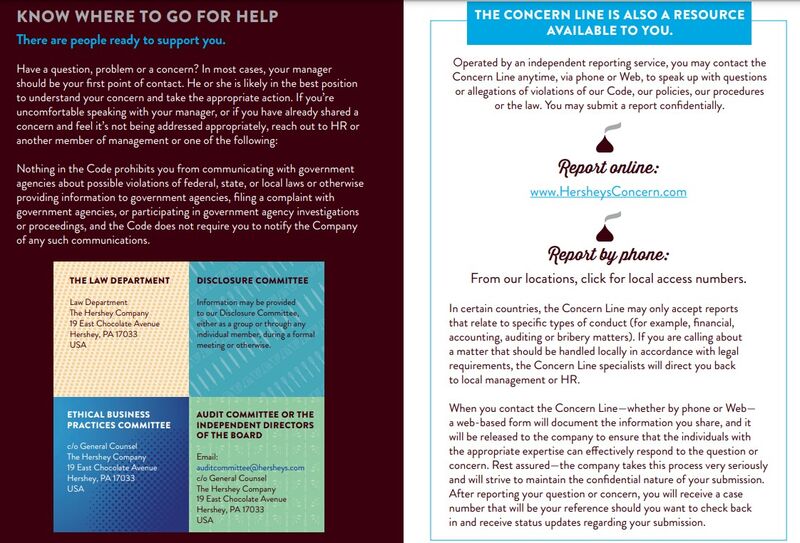
This page from The Hershey Company Code of Conduct makes it clear to employees how to raise an ethical concern. (Source: Hershey)
Establishing a concern line, as in the example above, is a great way for larger businesses to show employees, customers, and suppliers that they are serious about ethics. Smaller businesses may not need such an elaborate system, an anonymous email for employee concerns could be all you need.
In 1991, the US Sentencing Commission updated the federal guidelines for sentencing corporations found guilty of crimes.
Under the updated rule, fines and sentences could be reduced by up to 95% if the company had well-documented ethics systems, such as a code of conduct, ethics training program, reporting system, and enforcement and response system. These requirements became the foundation for most large corporations’ business ethics programs.
Get Employee Buy-in
If you have employees, get them on board with your business ethics plan from its inception. Get their feedback by asking direct questions. Prepare yourself for honest answers and set an environment where you and your managers are willing and open to hear different perspectives (even if they are challenging ones).
You can start by asking your employees:
- Do they think your company is serious about business ethics and upholding an ethical standard?
- Do employees know the process for bringing an ethical concern to your business leadership? Do they feel safe doing so?
- Do they see any ethical risks in your current operation that you might not be aware of?
Review your employee responses transparently. Show your team that you hear their concerns and let them see how their answers influence your code of conduct and ethics standards.
Use a Triple Bottom Line
The triple bottom line theory considers financial, social, and environmental information in a business’s ongoing performance reporting. Figuring a triple bottom line shows how well your business is performing toward your stated goals and values. It also provides figures you can showcase to employees, customers, potential investors, or suppliers to demonstrate the strength of your efforts and encourage their ongoing support.
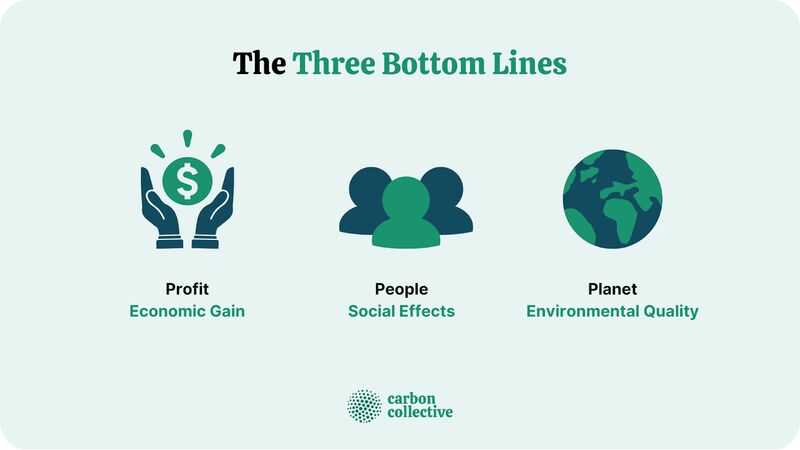
The triple bottom line evaluates the social and environmental effects of your business alongside profitability. (Source: Carbon Collective)
Get Third-party Certifications
Third-party certifications are not a requirement for an ethical business. However, obtaining them communicates to your team, suppliers, and customers that you take ethics seriously. There are a few major certifications you can get to officially promote your ethical business moves. Consider the following:
- B Corp designation: B Corp stands for benefit corporation. The nonprofit B Labs awards B Corp designations to businesses that demonstrate high ethical and environmental standards. A B Corp designation works for any type of business.
- Certified Employee-Owned: If worker protections are part of your ethical roadmap, consider employee ownership. It can be a marketing point, and you can get a third-party employee-owned certification to add to promotional materials.
- 1% for the Planet: This nonprofit organization certifies businesses that donate 1% of their profits to environmental causes.
- ClimatePartner: This nonprofit certifies partner businesses that transparently communicate their carbon emissions and take steps to reduce them. Most any product, service, or company that meets ClimatePartner standards can apply the ClimatePartner label to show their climate commitments.
- Plastic recovery: If you manufacture products or sell retail items, you can participate in plastic recovery efforts via organizations like rePurpose.
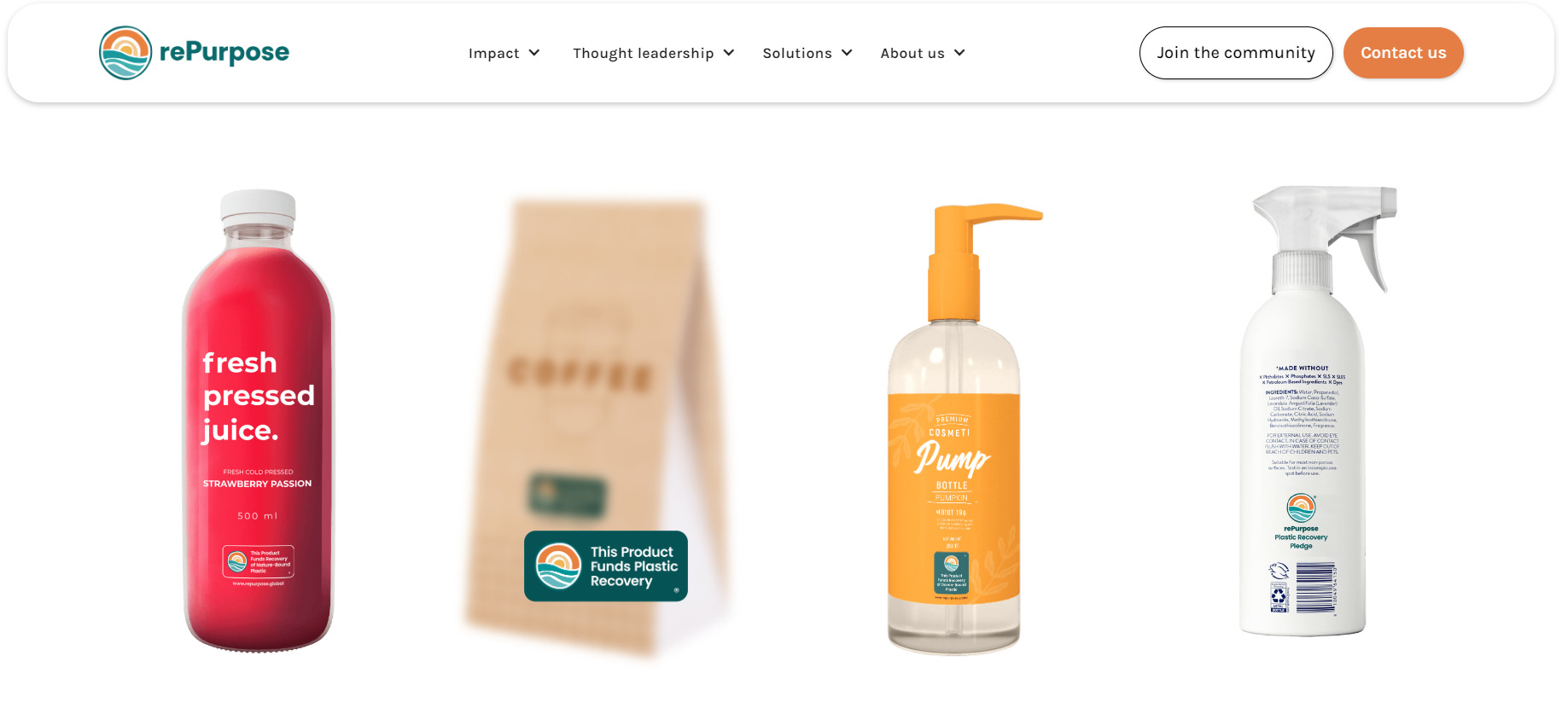
Businesses certified by rePurpose can add plastic-recovery labels to their products to show customers they are serious about their recovery efforts. (Source: rePurpose)
Business Ethics Challenges
Employing business ethics can give you additional motivation in your business and even earn you more business. But it is not without its challenges. Expand the sections below to consider each challenge in detail.
Everyone’s ideas of ethical and moral behavior can be a bit different. This is especially true if your business has locations in different parts of the country or the world. Consider a common ethical dilemma in business: Should you hire employees who are family members?
In some locations and industries, hiring married couples, siblings, or cousins may be the norm. But in others, it is seen as nepotism, favoritism, or a liability. You’ll need to communicate your company ethics clearly to all employees and get their buy-in no matter what cultural norms they are used to.
Committing to certain ethical standards like only working with suppliers that pay workers a living wage can limit your supply source options. Suppliers that meet your ethical standards may also be pricier to work with, which may slow a new business’s growth. Make sure you can afford to operate by the ethical standards you set. It is better to start with attainable ethical goals and increase them as your business expands.
Repeatedly failing to meet your stated standards can be demoralizing. And if your business isn’t profitable, it won’t last long.
The world of business is constantly changing as globalization increases, consumer preferences shift, and technology disrupts and reorganizes social and business landscapes. You’ll constantly be updating your ethical standards to confront new challenges. Recently, many businesses had to consider their approach to artificial intelligence (AI) and whether it is ethical to use in their business.
The rise of smartphones with cameras led some businesses to consider whether it was ethical for customers to film employees in the course of their work. Many also had to consider whether smartphones could be folded into their workplace culture or if they had to be excluded. The only thing that is certain about the future of business is that more technology shifts are likely.
Like core values, your state business ethics are goals you aspire to. Like any goal, there is a chance you may fall short of your stated business ethics. Suppose you tell staff, suppliers, and customers that your business supports a living wage from all your suppliers. After working with them for nearly a year, one of your major suppliers is revealed as an exploitative workplace. You can’t afford to replace this supplier right away, and their competitors charge more for the same product.
Replacing the supplier is stressful. Transparently communicating the situation to your employees, customers, investors, and other suppliers is another stressor. These stresses wouldn’t exist if you hadn’t committed your business to an ethical standard.
Business Ethics: Case Studies
The businesses listed below are examples of business ethics at work. Each has a unique approach that reflects the company’s specific challenges and concerns.
Hershey Chocolate Company
The Pennsylvania-based chocolate company has prioritized business ethics since its founding in 1894. During the Depression, Milton Hershey was determined not to lay off his workers, so he employed them to construct buildings on the chocolate plant site. A work foreman is said to have told Milton Hershey that a steam shovel could “do the work of forty men,” to which Milton Hershey replied, “Get rid of it and hire forty men.” Clearly, this was a business that embodied the ethic of supporting employees.

In 2024, Hershey is still concerned about workers. However, now, the major workforce concern for a chocolate manufacturer is the human rights of workers who harvest cacao and the ethical practices of all the suppliers and distributors throughout the supply chain. Hershey also prioritizes data privacy, avoiding conflicts of interest, and being good global citizens.
Hershey is an excellent example of a long-running company with a history of business ethics that has evolved with the times.
King Arthur Baking Company
This worker-owned cooperative clearly states its ethical commitments in business communications, such as the Supply Chain Disclosure statement published on the King Arthur website.
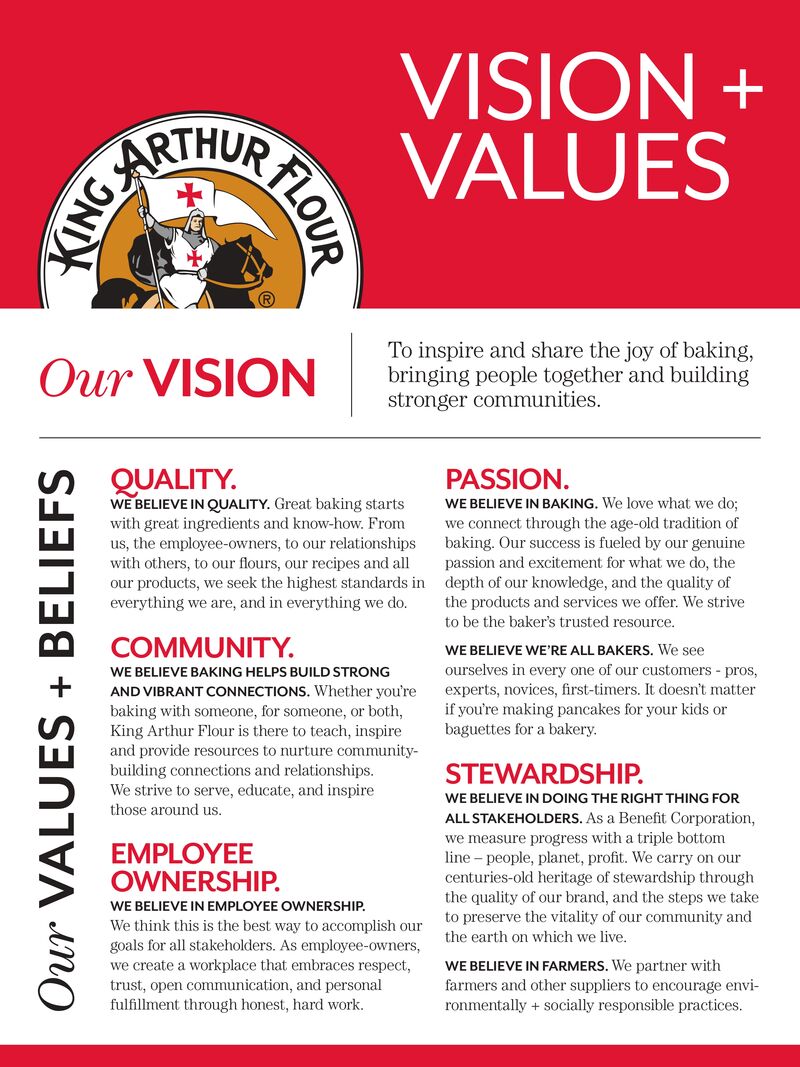
King Arthur Baking Company includes community as a core value that guides their business ethics. (Source: King Arthur Baking Company)
The baking brand also chooses to focus on the values of stewardship, supporting farmers, and providing a high-quality product while building community. Their website contains impact reports that show the milestones their nonprofit initiatives and community events have reached.
Dr. Bronner
Dr. Bronner soap company doesn’t have “core values.” Instead, it has “Cosmic Principles,” befitting a company with a history of free-spirited and freethinking owners (and customers). Despite the psychedelic title, these Cosmic Principles prioritize classic business ethics of doing right by customers, treating employees fairly, and extending that fairness to suppliers.
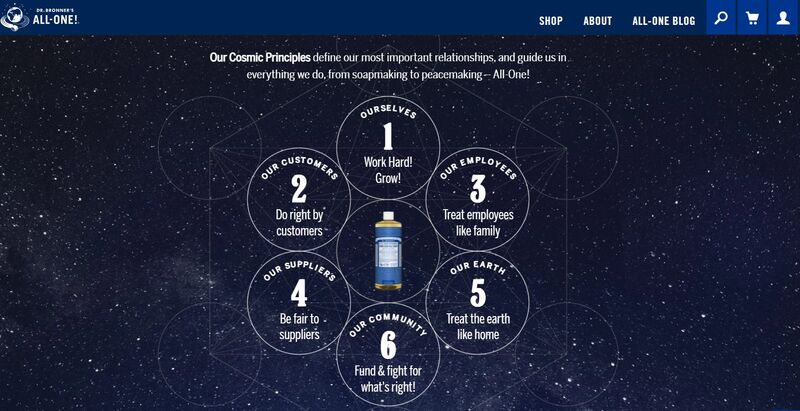
Dr. Bronner is a great example of a business with a counter-cultural identity that still makes business ethics work for its brand. It is also a great example of transparency. Every year, it publishes an “All-One!” Report that includes the previous year’s financial performance and illustrates how well the company achieved its ethical goals.
Frequently Asked Questions (FAQs)
Business ethics is a broad and fascinating subject. These are some of the common questions we hear about business ethics for small businesses:
Legal standards are based on laws and regulations that restrict how a business can act. Ethics go beyond that, accounting for what the business owner thinks is the right behavior. Businesses are required to comply with laws and regulations to avoid fines or legal action. Ethical behavior is voluntary. And while you might suffer consequences like high staff turnover, stressful vendor relationships, or low sales if you behave unethically, there are no legal repercussions to contend with.
Businesses of any size can operate ethically. Ethics are not a matter of business size or budget. If you have a limited budget, you might simply focus on different types of business ethics.
If your business is very small, you might start with your office or store location. Are there ways to affordably increase your energy efficiency to decrease your carbon footprint? Can you recycle or compost your trash? Or, simply update your internal and external communications to be more honest and transparent. Holding yourself and your business accountable to employees, customers and suppliers doesn’t need to cost a thing.
Bottom Line
Your business ethics are what you make them. They should reflect your company’s core values and inspire the practices and policies that you believe support fairness to employees, customers, suppliers, and competitors. There is no central certifying authority for business ethics. Each business decides for itself what ethics to embody, and your business ethics may change over time as your business grows and the world changes.